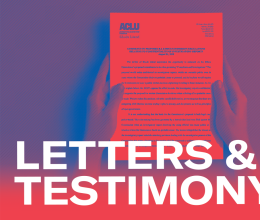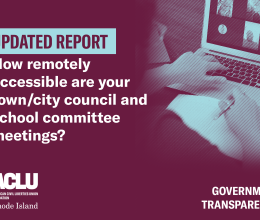The ACLU of Rhode Island today issued a critical analysis of the Attorney General’s (AG) response to State Representative Patricia Morgan’s Access to Public Records Act (APRA) request for documents pertaining to the AG’s expenditure of more than $50M in funds from the settlement of a recent Google lawsuit with the State. Representative Morgan has thus far been charged more than $3,700 for partial release of the records, some of which are heavily redacted. The ACLU’s analysis highlights “the clear need for legislation to strengthen the law.”
The ten-page analysis expressed particular concern over the complete redaction of a seemingly innocuous document addressing a purchase order for lapel pins. The AG’s justification for this wholesale redaction was that APRA allows public bodies to withhold any documents that are considered “memoranda.” The ACLU’s report claims that no public body has every interpreted the cited exemption “in this extraordinary manner.”
The report also took issue with a pattern of redacting invoice and purchase numbers from hundreds of documents. While they are seemingly minor, the ACLU noted that those redactions make it difficult to follow requisition orders across documents, which Rep. Morgan expressed an interest in doing, and likely added substantially to the fees she was charged, since APRA allows agencies to charge for the time it takes to redact records.
The analysis also used this dispute to raise concerns about the tendency by RI public bodies generally to view responding to APRA requests as a nuisance rather than a duty inherent in government work. Based on this controversy, the ACLU report calls for a number of amendments to APRA, including: (1) creating a presumption of waiving charges for record requests that are in the public interest; barring public bodies from charging for time spent redacting, or otherwise denying access to, records; and requiring that a specific exemption be cited with each redaction or withholding of a document.






